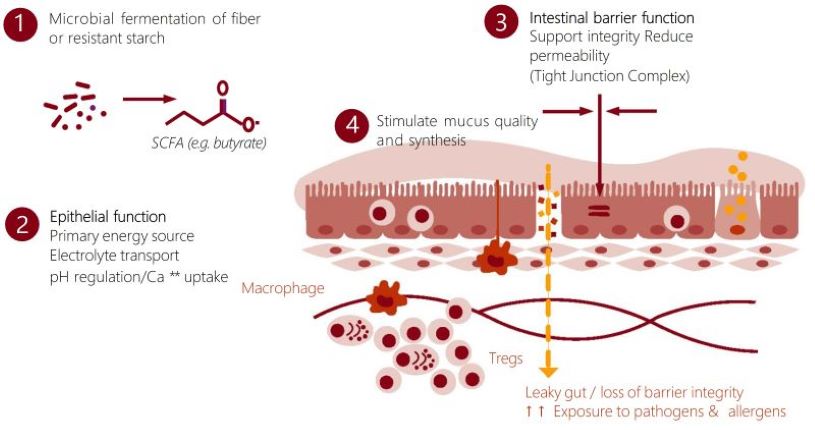ProPhorce™ SR 130: learnings after a decade of use in broilers
Animal production is facing several challenges, such as constantly increasing demand for animal protein, limited availability of raw materials, raising prices of raw materials and production costs in general, and increasing incidence of diseases in both animals and humans. Animal protein producers have to try to overcome these challenges by implementing optimal production conditions to be successful.
One of these conditions could be the use of short-chain fatty acids or organic acids as feed additives to improve and boost production in the field. Some of the used acids (e.g. formic, propionic, sorbic) are well known for their bacteriostatic and bactericidal effects. They are used generally at higher dosages in animal feeds to reduce bacterial counts in the feed and support against bacterial over proliferation in the upper part of the gastrointestinal tract. Other acids (e.g. propionic, butyric, valeric) are more known for their gut health properties. Among these acids, butyric acid is probably the most studied and researched acid in both human and animal nutrition.
Butyric acid: a critical element for gut health
Butyric acid seems to be an indispensable molecule for maintaining gut health in general. It can be considered as the source of energy for the epithelial cells and can have positive effects on the morphological development of the gut (e.g. higher villi length, better villi length to crypt depth ratio) It can also maintain the intestinal barrier integrity, support the mucus production, and have favourable effects on the intestinal microbiome. All these effects result in improved gut health and hence butyric acid can be a key element to ensure proper nutrient absorption in the small intestine.

Physiologically, butyric acid is a product of bacterial fermentation of undigestible carbohydrates that happens mainly in the lowest part of the gastrointestinal tract. The daily demand for butyric acid for different animal species has not been completely clarified so far, but it could be assumed that the range can be quite wide and usually should be covered entirely by fermentation processes. However, modern poultry diets supply the animals with insufficient amounts of nutrients for microbial fermentation in the lowest part of the gastrointestinal tract, where most of the acids are produced, and there will be only a little effect on the small intestine. It is therefore of utmost importance to supply butyric acid via feed to target the small intestine and ensure that this active compound can have beneficial effects on gut health where most needed.
The delivery of butyric acids right into the small intestine of animals is a critical factor in gut health, as only there they can exert their full power.
Targeted delivery with ProPhorce™ SR 130
ProPhorce™ SR 130, a product that has been on the market for more than a decade, provides animals with butyric acid ions in form of a triglyceride of butyric acid or tributyrin. Tributyrins are produced via esterification technology, a synthesis process that allows to combine the alcohol glycerol with carboxylic acids (organic acids) to form mono-, di- and triglycerides of the used acids. The hereby produced triglycerides are extremely stable and are able to by-pass the upper part of the gastrointestinal tract of the animals and reach the small intestine. There they are subsequently hydrolysed by pancreatic enzymes to give monoglycerides and free acids which ensures the targeted release of the active molecules where they are most needed.
The foundation to power production
ProPhorce™ SR 130 has been used in broiler production consistently all over the world. One of the major features of the product is its positive impact on gut morphology which results in benefits such as better feed performance and better animal performance. The most consistent modes of action of Perstorp’s tributyrin that can be observed in broilers are the improved villi height and improved villi height to crypt depth ratio.
A trial that was run at the Shandong Agricultural University in 2015 with 1080 Arbor Acre broilers divided into 6 dietary treatments showed the efficacy of the product in improving gut morphology not only in comparison to a negative control diet but also in comparison to a diet containing both bacitracin and colistin as antibiotic growth promoters at both day 14 and 28 of age.
- T1 negative control
- T2 positive control diet with 20 mg/kg bacitracin and 5 mg/kg colistin sulphate
- T3 positive control diet with 500 mg/kg ProPhorce™ SR 130 in the starter diet
- T4 positive control diet with 500 mg/kg ProPhorce™ SR 130 in starter and finisher diet
- T5 negative control diet with 500 mg/kg ProPhorce™ SR 130 in the starter diet
- T6 negative control with 500 mg/kg ProPhorce™ SR 130 in starter and finisher diet
Supplementation of ProPhorce™ SR 130 had significantly higher villi length in duodenum, jejunum, and ileum, significantly lower crypt depth in ileum and significantly higher villi height to crypt depth ratio in jejunum and ileum at 28 days of test period compared to the negative control (see table). ProPhorce™ SR 130 is an excellent product to improve the intestinal histology of broilers.

Improvements in intestinal morphology but also a general positive impact on gut health result in the overall benefit of performance improvement. ProPhorce™ SR 130 trials run over the years after the first product launch in 2012 and in many different production realities prove, that the product is an excellent feed additive and a perfect foundation to ensure production gains in broilers.
References are available on request. Please contact us via [email protected]